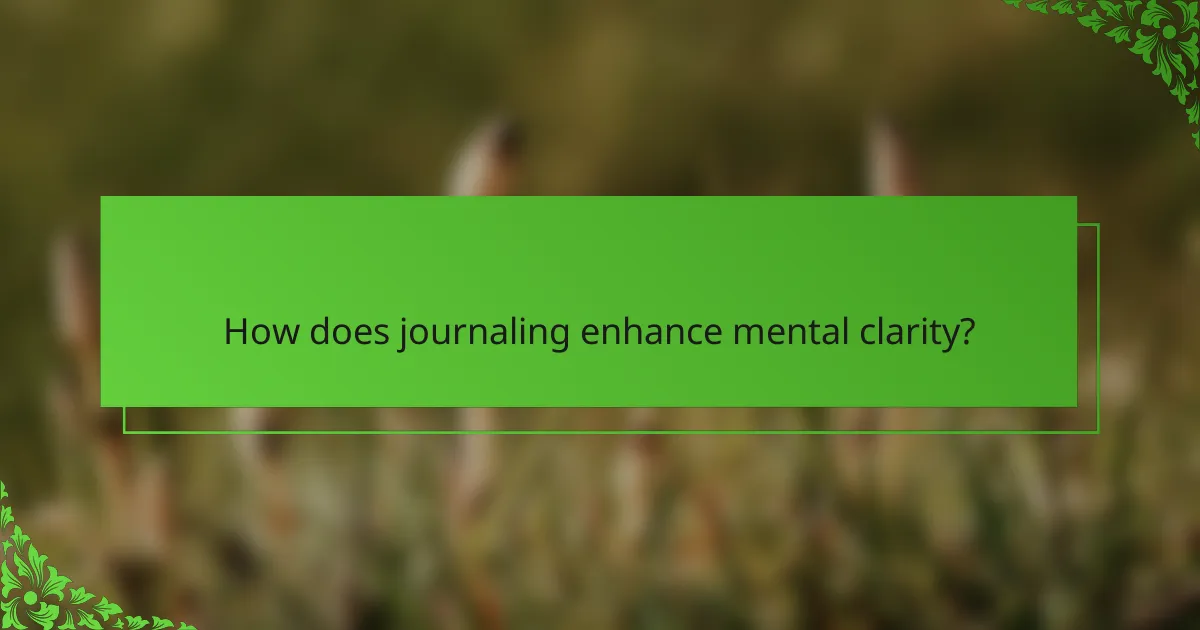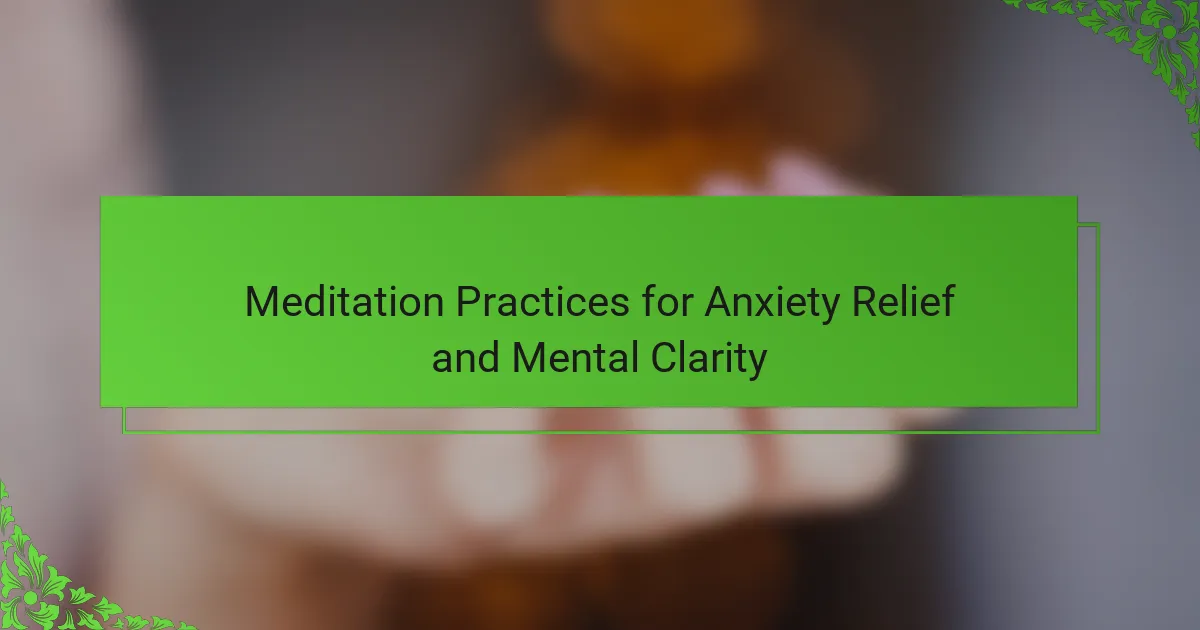Journaling can significantly enhance mental clarity by providing a structured outlet for thoughts and emotions. This article explores effective journaling techniques, the benefits for emotional processing and self-reflection, and how to optimize the practice for mental health improvements. Common pitfalls in journaling will also be addressed, along with tips for establishing a consistent routine.

How does journaling enhance mental clarity?
Journaling enhances mental clarity by providing a structured outlet for thoughts and emotions. It helps individuals process experiences, reducing mental clutter and promoting focus. Regular journaling can improve self-awareness and decision-making, leading to clearer thinking. Studies show that expressive writing can decrease anxiety and boost cognitive function, reinforcing its role as an effective coping strategy.
What are the psychological benefits of journaling for stress relief?
Journaling significantly reduces stress by enhancing self-reflection and emotional processing. It allows individuals to articulate thoughts, leading to greater mental clarity. Regular journaling can decrease anxiety levels, improve mood, and foster resilience. Studies indicate that expressive writing can lower blood pressure and enhance overall well-being.
How does journaling improve emotional regulation?
Journaling enhances emotional regulation by providing a structured outlet for thoughts and feelings. It encourages self-reflection, helping individuals identify triggers and patterns in their emotions. This practice fosters mindfulness, allowing for better management of stress and anxiety. Research indicates that expressive writing can lead to decreased emotional distress and improved mood. Regular journaling cultivates resilience, enabling individuals to process experiences and respond to challenges more effectively.
What role does journaling play in self-reflection and personal growth?
Journaling plays a crucial role in self-reflection and personal growth by enhancing mental clarity. It allows individuals to process emotions, identify patterns, and set goals effectively. Regular journaling fosters mindfulness, encouraging deeper insights into one’s thoughts and behaviors. As a result, it contributes to improved emotional resilience and self-awareness, essential components for personal development.

Which techniques are most effective for journaling?
Effective journaling techniques include free writing, gratitude lists, and prompts focused on emotions. These methods enhance mental clarity by fostering self-reflection and emotional processing. Free writing encourages unfiltered expression, while gratitude lists shift focus to positive experiences. Emotion-focused prompts allow deeper exploration of feelings, promoting insight and understanding.
What are the different styles of journaling and their purposes?
Journaling styles include reflective, gratitude, bullet, creative, and art journaling, each serving unique purposes. Reflective journaling promotes self-awareness, gratitude journaling enhances positivity, bullet journaling organizes thoughts, creative journaling fosters imagination, and art journaling combines visual expression with writing. These techniques improve mental clarity by providing structured outlets for emotions and thoughts.
How can prompts enhance the journaling experience?
Prompts can significantly enhance the journaling experience by providing direction and focus. They encourage deeper reflection and can help users articulate emotions more clearly. This structured approach fosters mental clarity and promotes emotional processing, making journaling a more effective coping strategy. Additionally, prompts can introduce new perspectives, inspiring creativity and self-discovery.
What is the impact of digital versus traditional journaling methods?
Digital journaling offers convenience and accessibility, while traditional journaling provides a tactile experience and deeper emotional connection. Digital methods often include features like searchability and multimedia integration, enhancing mental clarity. In contrast, traditional journaling can foster mindfulness and creativity through handwritten expression. Both methods serve as effective coping strategies, but individual preferences determine their impact on mental clarity.

Why do people choose journaling as a coping strategy?
People choose journaling as a coping strategy because it enhances mental clarity and emotional expression. Journaling allows individuals to process thoughts and feelings, reducing anxiety and stress. It can serve as a reflective tool, improving self-awareness and problem-solving skills. Research indicates that regular journaling can lead to better emotional regulation and overall well-being.
What specific challenges does journaling help address?
Journaling helps address challenges like stress, anxiety, and emotional overwhelm. It promotes mental clarity by organizing thoughts and providing a safe space for self-expression. Additionally, journaling can enhance problem-solving skills and boost self-awareness. Studies indicate that regular journaling can improve mood and reduce symptoms of depression.
How does journaling compare to other coping strategies?
Journaling provides unique benefits compared to other coping strategies, such as enhanced mental clarity and emotional processing. Unlike techniques like meditation or exercise, journaling allows for immediate reflection and articulation of thoughts. It serves as a personal record, enabling users to track progress and identify patterns in their emotions. Additionally, journaling can be tailored to individual preferences, whether through free writing, prompts, or structured formats. This adaptability makes it a versatile tool for managing stress and anxiety.

What unique attributes make journaling effective for mental clarity?
Journaling enhances mental clarity through unique attributes like emotional processing, self-reflection, and stress reduction. These attributes allow individuals to articulate thoughts, identify patterns, and gain insights. Emotional processing enables the release of pent-up feelings, while self-reflection fosters a deeper understanding of personal experiences. Stress reduction occurs as writing serves as a therapeutic outlet, promoting relaxation and mental organization.
How does the frequency of journaling affect its benefits?
Frequent journaling enhances its benefits by promoting mental clarity and emotional processing. Regular practice allows individuals to articulate thoughts and feelings, leading to improved self-awareness and stress reduction. Studies indicate that daily journaling can significantly lower anxiety levels and boost overall well-being. Moreover, consistency in journaling helps establish a reflective habit, which can deepen insights and facilitate personal growth over time.
What personal experiences highlight the transformative power of journaling?
Personal experiences often reveal how journaling fosters mental clarity and emotional resilience. Individuals report significant transformations through techniques like free writing and gratitude journaling. For instance, a person facing anxiety may find relief by documenting their thoughts, leading to reduced stress levels. Another individual might experience enhanced self-awareness by reflecting on daily events, ultimately improving decision-making. These personal narratives highlight journaling’s unique ability to serve as a powerful coping strategy, facilitating personal growth and emotional healing.

What are the common pitfalls in journaling practices?
Common pitfalls in journaling practices include inconsistency, overthinking, and lack of clarity. Inconsistent journaling can lead to missed opportunities for reflection and growth. Overthinking may result in self-criticism, hindering the benefits of the practice. Additionally, vague entries can obscure insights, reducing mental clarity. Establishing a routine, focusing on feelings rather than perfection, and setting clear intentions can help overcome these challenges.
How can individuals overcome writer’s block in journaling?
Individuals can overcome writer’s block in journaling by using specific techniques that enhance creativity and mental clarity. Techniques include setting a timer for free writing, using prompts, and creating a comfortable writing environment. These strategies can help unlock thoughts and feelings, making journaling a more effective coping strategy. Regular practice can lead to improved mental clarity and emotional expression.
What mistakes should be avoided to maximize journaling benefits?
To maximize journaling benefits, avoid common mistakes such as inconsistency, lack of focus, and negative self-talk. Consistency in journaling enhances mental clarity and emotional processing. Focus on specific themes or prompts to guide your reflections. Avoid negative self-talk that can undermine the positive effects of journaling. Embrace a growth mindset and celebrate progress to fully leverage journaling as a coping strategy.

How can journaling be optimized for mental health improvements?
Journaling can be optimized for mental health improvements by implementing structured techniques that enhance mental clarity. Regularly practicing gratitude journaling can boost positivity, while expressive writing helps process emotions. Setting specific goals for each session can provide focus and direction.
Incorporating mindfulness techniques during journaling can deepen self-reflection. For example, dedicating time to reflect on daily experiences fosters awareness and insight. Tracking moods or triggers can also identify patterns, aiding in emotional regulation.
Establishing a routine, such as journaling at the same time each day, creates consistency. This habit reinforces commitment and allows for deeper exploration of thoughts over time.
Lastly, experimenting with different formats, like bullet points or free writing, can keep the practice engaging. This variety encourages creativity and prevents stagnation, making journaling a sustainable coping strategy for mental health.
What best practices should be followed for effective journaling?
To journal effectively, establish a routine, set clear goals, and reflect on your entries. Prioritize consistency, as regular journaling enhances mental clarity. Utilize prompts to guide thoughts and embrace authenticity in your writing. Experiment with different formats, such as bullet points or narratives, to discover what resonates most.
How can individuals tailor their journaling approach to their personal needs?
Individuals can tailor their journaling approach by identifying personal goals and preferences. First, choose a journaling style that resonates, such as gratitude, reflective, or bullet journaling. Next, set a consistent schedule that fits daily routines, enhancing commitment. Incorporate prompts that align with personal experiences to deepen self-reflection. Experiment with various formats, including digital or handwritten, to find what feels most comfortable. Lastly, assess and adjust the journaling practice regularly to ensure it continues to meet evolving personal needs.



